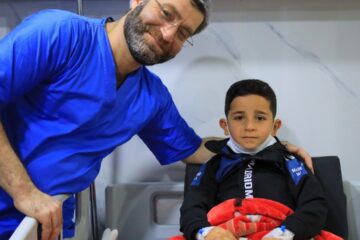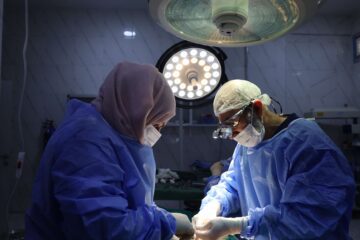July 2, 2024
On July 1, residents living in and around the last fully-functional hospital in Gaza were ordered to evacuate, causing concern that the the largest hospital in Gaza, the European Gaza Hospital, would soon become inoperable. On July 2, The International Committee of the Red Cross said in a statement that the hospital was “now unable to continue functioning effectively” because so many of its staff has fled for safety. Medical supplies and patients were being transferred to a partially functioning hospital.
The European Hospital already suffered from a severe lack of basic supplies to care for patients, such as soap and antiseptics to stem the rampant tide of infections causing an abnormally high mortality rate.
In late May, a European Union report said that the remaining open hospitals in Gaza, about 12 of 36, were partially functioning, and operating under severe limitations, concluding that more than 9,000 severely injured people are at risk of dying due to the lack of adequate health care. Since October 7, the WHO has recorded 443 attacks on health facilities in Gaza. And the Ministry of Health in Gaza reported that more than 493 healthcare workers have been killed.
The United Nations said on July 2 that due to the evacuation order, up to 250 million Palestinians could be fleeing their temporary shelters in the area of the European Hospital in the city of Khan Younis.
SAMS’ Vice President Dr. Ammar Ghanem served on an ill-fated medical mission in May at the European Hospital that struggled to keep up with mass casualties amid the limited supplies and diminishing staff who faced an earlier evacuation order of nearby Rafah. With the Rafah border closed, the mission was temporarily marooned.
Despite health conditions worsening, the ability to address them has only gotten harder. International medical volunteers are not allowed to carry in vital supplies. They now must remain at least four weeks (an almost insurmountable amount of time for health workers to take leave from their existing work to volunteer), and no volunteers with Palestinian ancestry, including a grandparent, are allowed to enter.
“We are aghast that an unimaginable humanitarian situation may soon become even worse with the future of the European Hospital—a last tenet of hope for a besieged, civilian population—in question,” said SAMS’ President Dr. Mufaddal Hamadeh, in Istanbul for a SAMS International Medical Conference. “International Humanitarian Law is clear: Medical workers must be free to care for civilians during conflict, including international volunteers who should have free mobility to save the innocent.”
SAMS Member Dr. Adam Hamawy who served in the European Hospital with SAMS’ VP Dr. Ammar Ghanem in May moderated a panel on June 30 in Istanbul at SAMS’ medical conference on the impact of attacks on healthcare in Gaza and Syria. “The level of civilian casualties that I experienced was beyond anything I’d seen before,” Dr. Hamawy told the AFP news agency last month. “Most of our patients were children under the age of 14. This has nothing to do with your political views.”
If the European Hospital closes, Gaza will lose more capacity to serve the most severe cases, especially specialized care to treat survivors of blasts who need intensive care to survive.
SAMS calls for the European Hospital to remain open and fully operable, and that its staff is protected. Further, international medical volunteers must have full access to Gaza, and severely ill patients should be allowed to cross borders to gain life-saving treatment. SAMS also calls for an immediate cessation of violence and for an uninhibited flow of humanitarian assistance to those in dire need.
SAMS is a nonprofit, non-political organization that works on the front lines of crisis relief, providing medical and humanitarian assistance to the most vulnerable in Syria, its neighboring countries, and beyond. Last year, SAMS provided lifesaving medical services to 3.6 million people.



